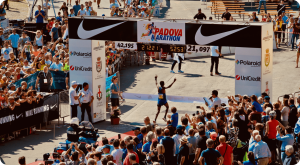Running a marathon is quite an accomplishment, and when you are running one as part of your Ironman triathlon training, this requires a whole new level of preparation.
In this handy checklist, we’ve gathered together all you might need to know to get ready for your race.
Whether you are running your first-ever marathon or just preparing for another race, make sure you check out this guide for pro tips on performing your best throughout all these challenging 42.2 kilometers.
Let’s go!
Training Review
First things first: do you have a training schedule? For example, did you manage to run the number of times you planned each week?
Consider how your long runs went.
Did you complete them comfortably, or did you struggle? Were you able to finish them at the pace you wanted?
Reflect on any problems you faced during training.
Maybe you had to deal with injuries, busy schedules, or bad weather that affected your training.
Think about the milestones you reached during training.
For instance, did you run the longest distance ever? Did you beat your previous record for the fastest kilometer?
Have you created your marathon pacing strategy?
Consider improvements in your running ability.
Did you notice that you’re running faster or feeling stronger during your workouts?
Remind yourself of the effort you’ve put into training. Think about all the early mornings, tough workouts, and sacrifices you’ve made to get to this point.
Consider how confident and mentally strong you feel about tackling the marathon.
Are you excited and ready for the challenge, or do you feel nervous and unsure?
It is OK to feel anxious before the big race, but if you’re feeling too overwhelmed, consider talking to a mental performance coach for professional advice and support. You can also check out this marathon race recap for inspiration and actionable tips.
Check out this marathon for beginners guide to learn more about the right training strategy and workout schedule examples.

Rest and Recovery
This is one of the most important points in our race day checklist.
Emphasize rest in the race week leading up to the marathon.
Make your workouts shorter and less intense to allow your body to recover fully.
Incorporate activities like gentle stretching, foam rolling, or yoga to help alleviate any lingering muscle tension or tightness.
Prioritize sleep and aim for at least 7-9 hours of quality sleep each night to ensure your body is well-rested and ready to perform both during and post-race.
Hydration
Start hydrating early in the week leading up to the race to ensure your body is adequately hydrated by race morning.
It is important to monitor the color of your urine to determine your hydration levels. Ideally, it should be pale yellow, which indicates proper hydration.
Incorporate electrolyte-rich beverages like sports drinks or coconut water to replenish electrolytes lost through sweat.

Nutrition
Maintain a balanced diet with a focus on complex carbohydrates for sustained energy.
Incorporate foods like whole grains, fruits, vegetables, and lean proteins into your meals.
Avoid excessive consumption of high-fat or high-fiber foods that could potentially lead to digestive issues during the race.
Also, it is better not to try any new foods before the race to avoid any unpredictable organism reactions.
Practice your pre-race nutrition plan to make sure your body i responsinge well and the food doesn’t cause any stomach discomfort.

Gear Check
Lay out all your race-day essentials and inspect each item for wear and tear.
Ensure your running shoes have sufficient tread and support, and replace them if necessary.
In case you are looking for high-quality triathlon gear, check out our gear marketplace.
Check that your socks are moisture-wicking and comfortable to prevent blisters.
Make sure your clothing is appropriate for the weather conditions, whether it’s hot, cold, or rainy.
If needed, take extra clothes with you in case you’re gonna need to change.
Race-Day Apparel
Check the weather forecast for race day and adjust your clothing choices accordingly.
Dress in layers if temperatures are expected to fluctuate throughout the race.
Wear moisture-wicking fabrics to help keep you dry and comfortable during the race.
Don’t forget essential accessories like sunglasses, a visor, or a hat for sun protection. Here is how to choose sunglasses for running.
Race Kit
Ensure you have all necessary race materials, including your bib number, timing chip, and any waivers or identification required by the race organizers.
Double-check that your bib is securely attached to your race attire using safety pins or a race belt.
Pack any additional items you may need, such as a hydration pack, energy gels, electrolyte drinks, lip balm, body glide, or medical supplies.
The last ones you can also find on aid stations.

Race Information
Familiarize yourself with the race course, including the starting line, any elevation changes, aid station locations, and potential landmarks.
It’s also worth checking whether security cameras are in operation so you know where to signal towards if you find yourself in trouble. Look up the difference between bullet vs turret cameras to gain a better understanding of camera coverage.
Set realistic goals for the race based on your training and fitness level.
For this, you need to consider factors like previous race performances, current fitness, and environmental conditions.
Develop a pacing strategy that aligns with your race goals, whether it’s aiming for a specific finish time, maintaining an even pace throughout the race, or negative splitting.
Logistics
Plan your transportation to the marathon race and start well in advance, considering factors like traffic, road closures, and parking availability.
Arrive at the start line early to allow ample time for parking, packet pickup, gear check, and warming up.
Familiarize yourself with the race-day schedule, including start times, wave assignments, and any pre-race ceremonies or activities.
Final Check
To avoid unnecessary stress, conduct a final check of all your race-day gear and essentials the night before the marathon.
Ensure everything is packed and organized, including your race bib, timing chip, GPS watch, and hydration supplies.
Lay out your race-day outfit and double-check that you have everything you need, from head to toe, including your post-race bag.
Even though pre-race jitters might be hitting hard, try to relax and unwind before bed, focusing on positive thoughts and visualizations of crossing the finish line strong.
Connect with your fellow runners for some inspiration and athlete motivation.

You’ve got this!
To train or not to train the day before a triathlon race? Find out the answer in our recent blog.






